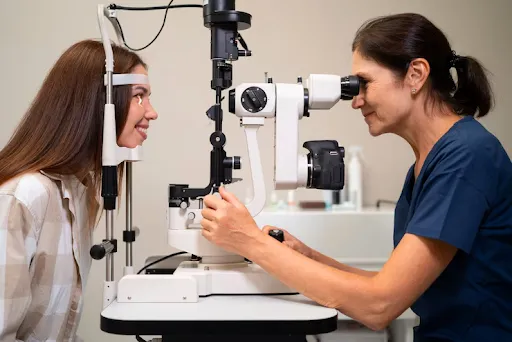Eye Health
How Eye Exams Detect More Than Just Vision Issues
FSDAVCFEBFEVSDDVFSD
FSDAVCFEBFEVSDDVFSD
FSDAVCFEBFEVSDDVFSD
The Eyes as Health Indicators
Comprehensive eye exams are not just about assessing vision clarity; they are essential for detecting broader health issues. The eyes offer a unique view into the body’s vascular and nervous systems, allowing optometrists to identify early signs of systemic diseases. Conditions like diabetes, hypertension, and autoimmune disorders often first show symptoms in ocular structures.
For example, diabetic retinopathy, a complication of diabetes, can be detected through changes in the retina’s blood vessels. Similarly, hypertension can cause narrowing or leaking of retinal arteries, signaling potential cardiovascular issues. Regular eye exams are thus crucial for the early detection and management of these conditions, ensuring timely intervention and better overall health outcomes.
Comprehensive eye exams are not just about assessing vision clarity; they are essential for detecting broader health issues. The eyes offer a unique view into the body’s vascular and nervous systems, allowing optometrists to identify early signs of systemic diseases. Conditions like diabetes, hypertension, and autoimmune disorders often first show symptoms in ocular structures.

For example, diabetic retinopathy, a complication of diabetes, can be detected through changes in the retina’s blood vessels. Similarly, hypertension can cause narrowing or leaking of retinal arteries, signaling potential cardiovascular issues. Regular eye exams are thus crucial for the early detection and management of these conditions, ensuring timely intervention and better overall health outcomes.

Detecting Systemic Conditions
Eye exams are not just limited to assessing vision but can reveal a range of systemic health issues. Autoimmune diseases, such as lupus or multiple sclerosis, often cause inflammation in different parts of the eye. Through a comprehensive eye exam, optometrists can detect these early signs of inflammation, potentially leading to a timely diagnosis and intervention. Identifying these conditions early can help prevent further complications and improve treatment outcomes.
Thyroid disorders, like Graves' disease, can also present noticeable changes in the eyes, such as bulging or irritation. An optometrist can spot these signs during a routine eye exam, enabling early detection and management of the condition. Addressing thyroid disorders early can prevent long-term damage and alleviate symptoms.
Additionally, certain cancers, such as lymphoma and leukemia, may present ocular symptoms, such as abnormal blood vessels or swelling around the eyes. These signs can be observed during an eye exam and serve as a warning for further medical investigation. The ability to detect these serious health conditions through regular eye exams highlights their critical role in early diagnosis and prevention. Regular eye check-ups not only help maintain vision but also contribute to overall health by uncovering hidden health issues.
Importance of Regular Check-Ups

Regular eye exams are crucial, even for individuals who don't experience noticeable vision problems. Many systemic diseases, such as diabetes or high blood pressure, may not show symptoms in their early stages but can be detected through subtle changes in the eyes. For example, signs of diabetic retinopathy or retinal damage from high blood pressure can appear long before other symptoms develop, allowing healthcare providers to identify these issues early.

By recognizing these early warning signs during eye exams, healthcare providers can initiate timely interventions to prevent more severe complications, such as vision loss or cardiovascular problems.
Incorporating routine eye exams into one’s health care regimen is a proactive step to safeguard overall health, helping to detect hidden conditions and maintain long-term well-being. Regular eye check-ups contribute not only to vision health but also to early detection of systemic diseases, enhancing overall wellness.
At Kleinwood Vision, we prioritize the importance of comprehensive eye exams in protecting both ocular and overall health. Our detailed evaluations go beyond simply assessing vision to identify potential signs of systemic conditions, such as diabetes, hypertension, and autoimmune disorders. The eyes can reveal early indicators of these health issues, allowing us to catch them before they become more serious or symptomatic. Through routine check-ups, we can detect subtle changes in the eyes that may signal underlying health concerns.
By scheduling regular eye exams, patients not only preserve their vision but also benefit from early detection and timely management of potential health issues. Identifying conditions early significantly increases the chances of effective intervention, helping to prevent more severe complications. At Kleinwood Vision, we believe that eye care plays a critical role in overall wellness. Our comprehensive exams provide a holistic approach to healthcare, offering patients peace of mind and a proactive strategy for maintaining long-term health.
Comprehensive Eye Exams Explained
A comprehensive eye exam involves a series of tests designed to evaluate visual acuity and examine both the internal and external structures of the eyes. These evaluations can uncover abnormalities that may indicate underlying systemic diseases. For instance, retinal imaging allows optometrists to detect microaneurysms or hemorrhages, which are often associated with diabetic retinopathy. These subtle changes in the retina can provide critical insights into a patient’s overall health, allowing for early intervention.
In addition to retinal assessments, optometrists also perform optic nerve evaluations, which can reveal signs of swelling linked to conditions such as hypertension or increased intracranial pressure. These early indicators are crucial for diagnosing serious health issues before symptoms become more apparent. By conducting thorough eye exams, optometrists play a key role in identifying systemic health problems early, ensuring that patients receive the necessary medical attention to address these conditions and prevent further complications.
Eye Exams and Diabetes
Diabetes can significantly impact eye health, leading to conditions such as diabetic retinopathy, which damages the blood vessels in the retina. If left untreated, this condition can result in severe vision loss. Regular eye exams are vital for individuals with diabetes, as early detection of retinal changes allows for prompt interventions to prevent further progression.
In addition to diabetic retinopathy, individuals with diabetes are at higher risk for other eye conditions, such as cataracts and glaucoma. Cataracts cause clouding of the lens, while glaucoma increased pressure in the eye, potentially leading to optic nerve damage. Both conditions can worsen if not addressed early.
Diabetes can significantly impact eye health, leading to conditions such as diabetic retinopathy, which damages the blood vessels in the retina. If left untreated, this condition can result in severe vision loss. Regular eye exams are vital for individuals with diabetes, as early detection of retinal changes allows for prompt interventions to prevent further progression.
In addition to diabetic retinopathy, individuals with diabetes are at higher risk for other eye conditions, such as cataracts and glaucoma. Cataracts cause clouding of the lens, while glaucoma increased pressure in the eye, potentially leading to optic nerve damage. Both conditions can worsen if not addressed early.


Routine eye exams are essential in identifying these diabetes-related eye complications. By detecting issues early, healthcare providers can offer timely treatments, helping to preserve vision and manage the ocular effects of diabetes more effectively.
Eye Exams and Hypertension
Hypertension, or high blood pressure, can have significant implications for eye health. One of the key ways high blood pressure affects the eyes is through hypertensive retinopathy, a condition characterized by changes in the retinal blood vessels. These changes can include narrowing of the retinal arteries, hemorrhages, and swelling of the optic nerve. Hypertensive retinopathy is an early warning sign of the damage hypertension can cause to the vascular system, and its detection can help assess the severity of the condition.
Identifying hypertensive retinopathy during a comprehensive eye exam is crucial for understanding how hypertension is impacting the body. Early detection of these ocular changes can help doctors determine the extent of blood pressure-related damage and adjust treatment plans accordingly. The signs observed in the retina can provide valuable insights into the overall health of the cardiovascular system.
Regular eye exams serve as a non-invasive method to monitor the effects of high blood pressure on the body, offering a window into the condition of blood vessels without the need for invasive testing. This makes eye exams an essential tool for comprehensive cardiovascular care. By identifying ocular changes early, optometrists and healthcare providers can work together to manage hypertension more effectively and reduce the risk of complications such as stroke, heart disease, or kidney damage.
Moreover, regular eye exams can help detect hypertensive retinopathy before symptoms appear, which is particularly important for those who may not be aware they have high blood pressure. By incorporating eye exams into routine healthcare, individuals can better manage their blood pressure and maintain long-term health.
Eye Exams and Autoimmune Disorders
Autoimmune disorders, such as rheumatoid arthritis and lupus, can have significant effects on eye health. In many cases, these conditions manifest in the eyes before other symptoms become apparent. Inflammation in the ocular tissues, including the uvea and sclera, can lead to discomfort, redness, and vision problems. Detecting these changes early is crucial for proper diagnosis and treatment.

Autoimmune disorders, such as rheumatoid arthritis and lupus, can have significant effects on eye health. In many cases, these conditions manifest in the eyes before other symptoms become apparent. Inflammation in the ocular tissues, including the uvea and sclera, can lead to discomfort, redness, and vision problems. Detecting these changes early is crucial for proper diagnosis and treatment.
Comprehensive eye exams are essential for identifying signs of autoimmune diseases in the eyes.
Comprehensive eye exams are essential for identifying signs of autoimmune diseases in the eyes.
Conditions like uveitis, which causes inflammation in the middle layer of the eye, and scleritis, which involves inflammation of the sclera, can often be detected during routine eye exams. These findings serve as critical clues for healthcare providers to investigate and manage the underlying autoimmune condition.
Early detection of autoimmune disorders through eye exams can significantly improve outcomes by enabling timely intervention and treatment. By identifying ocular signs, optometrists play a key role in the early diagnosis and management of autoimmune diseases, helping to preserve vision and overall health.
Conclusion: Prioritize Eye Health
The eyes provide a unique window into the body's overall health, often revealing early signs of systemic diseases before other symptoms appear. Conditions such as diabetes, hypertension, and autoimmune disorders can have ocular manifestations that are detectable through comprehensive eye exams. These exams go beyond checking for vision problems, offering valuable insights into an individual’s general health.
Regular eye exams are essential for early detection of vision or health issues, allowing timely medical intervention and preventing complications. Prioritizing routine eye care helps maintain vision and manage underlying conditions that may otherwise go unnoticed. Eye exams support long-term wellness and overall health. If you're due for a checkup or have concerns about your vision, don’t wait contact us to schedule your appointment today.

Contact Info
Hours of Operation
Mon - Fri | 9:00 AM - 5:00 PM
Sat - Sun | Closed
Holiday Hours: We are closed for the following holidays: New Years Day, Memorial Day, Independence Day, Labor Day, Thanksgiving Day, Christmas Day
© 2026 Kleinwood Vision. All rights Reserved.


